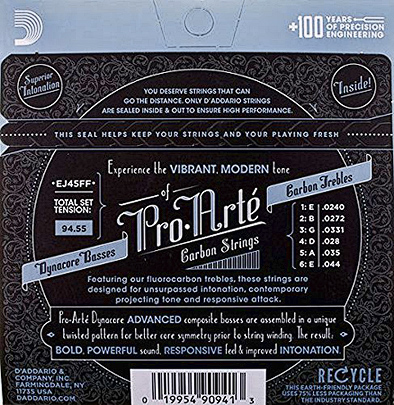The treble strings of the EJ45FF set are made of fluorocarbon, a material orginally developed for fishing line. It's extremely tough, smooth and much more resistant to stretching and abrasion than nylon. It's also denser than nylon, resulting in a smaller diameter and increased tension. According to D'Addario, Carbon trebles are brighter than Extended Play and Dynacore and, indeed, my guitars really pop in the mix with Carbons.
Ramirez A-1
With nylon strings, my old Ramirez has a powerful but dark and sweet voice. With the Carbons installed, there was a radical shift of tonal character—no longer sweet and dark. The first two strings were bright—too bright for my taste. However, the Carbons are extremely dynamic, long sustaining and can take shockingly heavy playing before buzzing. Sadly, vibrato technique became exceedingly difficult: great left hand effort required for tiny vibrato results. Intonation was absolutely perfect on these trebles but Carbons are just not the right strings for my old Ramirez.
Eventually I replaced the the first and second strings with Titanium trebles but left the fluorocarbon third string. Indeed, that combination worked well: mixes well with nylon first and second strings but provides increased definition, sustain and bite, curing the typical tubby nylon G string tone.
Hirade TH8SS
I also tried a set of Pro Arté Carbon on my more mellow voiced Hirade TH8SS and loved the resulting tone: sweet, round and strong. Like the Ramirez, vibrato response on the Hirade was greatly reduced, and tension felt too high.
One nice aspect of fluorocarbon is increased pitch stability over nylon: settles in quickly and holds pitch better. For example, if I drop the G string to F-sharp to play a lute piece, the string stays put! A nylon or composite string would quickly drift sharp.
Tension and Feel
A couple observations on the feel of Carbon trebles. They’re smooth under the fingers but a little less silky smooth than D'Addario Titanium, nylon trebles or even Seaguar Flouro Premier fishing line. There are no shift or stroke whistles like those that plague rectified trebles. However, these trebles are higher tension and thinner than other E45 (normal tension) variants and bite into my fingertips like angry bees. Not the best choice for long gigs or guitarists with sensitive fingertips. The first string only measures .024” vs .028 for D'Addario Pro Arté (EJ45). The total tension at pitch is a whopping 94.55LB vs 85.85LB for EJ45 and 81.05LB for EXP45. So Carbon Trebles are not for the faint of finger…
Sadly, I couldn't get used to the tension of the EJ45FF set. After failing to find a thinner fluorocarbon first string I begrudgingly tried Seaguar fluorocarbon fishing line on my Hirade guitars. I was shocked to find I really loved their Flouro Premier 40 LB (.022") line as a first string: excellent intonation and beautiful tone. I suspect D'Addario buys Seaguar fluorocarbon and cuts and repackages it for retail.
If you haven’t used composite core basses or carbon trebles before, be aware that they wind up to pitch more quickly than nylon strings. A few spins of the crank and the basses are good. One of my friends broke a composite bass string first time up because he used the same amount of cranks as regular D’Addario ProArte basses without listening to the pitch. The up side is less cranks mean faster installation and faster stretch out times due to the less elastic materials.
Bass Strings
The EJ45FF basses sound great—robust, full and plenty of harmonics—but are simply stock Dynacore basses. So a wee bit more bite than EXP or Pro Arté Nylon Core (EF45). Bass intonation is generally good but the D-string was slightly flat at the 12th fret (typical for D’Addario).
Final Blurb
Carbon strings are very different in feel and sound from traditional nylon classical guitar strings: higher tension, louder and brighter. They are ideal for giving extra bite to a dark voiced instrument or nailless (flesh stroke) player. Yes, they are powerful and dynamic but the brightness and sustain of the trebles set them apart. Finally, the fluorocarbon material is less prone to wear from fingernail scratches, retaining a smooth surface two or three times longer than nylon.
Finally, please help support this website by purchasing these strings at Amazon.
Price: $20
Features
- EJ45FF String Gauges: .0240, .0272, .0331, .028, .035, .044
- Composite core basses
- Carbon trebles
- Available in normal (EJ45FF) and hard tension (EJ46FF)
10/18/2015 | Updated 08/16/2019

